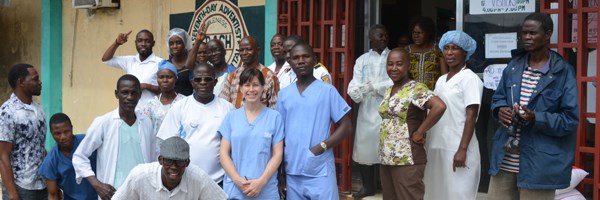
Cooper SDA Hospital is a busy 48-bed hospital that is located in the capital city of Monrovia, Liberia. Facing a near-shut down as a result of the 1980 civil war, the hospital has been managed by Adventist Health International since 2008 and continues to be fully operational to this day. The hospital is very active in the community and continues to remain open despite the current Ebola crisis occurring at its doorsteps.
While Adventist Health International and other agencies will support Cooper Hospital through this crisis by bolstering supplies of isolation gowns and personal protective equipment, there remains a need for infrastructure. Helping this hospital expand its facilities for trauma care will help meet the needs in Monrovia. As one of a few hospitals in the bustling capital of Liberia, Cooper Hospital is essential for providing care to its patient population. However, as the hospital management has evolved throughout the years, so have the needs for the hospital. Currently, one of the biggest needs at Cooper Hospital entails renovations to their OR in order to be able to provide more trauma surgery services to Monrovia.
Despite the challenges being faced in Liberia by the Ebola Crisis, Cooper Hospital has remained open and Ebola virus-free to this date. This has not been easy for them and they are quickly becoming in need of items such as the following: gloves, masks, surgical gowns and other items to maintain physical safety and protection for their staff and patients.
There are two missionary doctors in the region. Dr. Lolita Largosa and her husband are from the Philippines, and Dr. Gillian Seton is from the United States. Below are some words from them to you that describe what is happening in Liberia right now:
Dr. Seton writes of Ebola: "No cure, no vaccine. The only thing we can do is isolate cases so that the disease doesn’t spread among families and neighbors, and take extreme precautions in hospitals and clinics to try to prevent the spread of the disease... As other hospitals have been designated as the facilities capable of isolating and caring for Ebola cases, we are endeavoring to help all the other patients who still need care throughout this crisis (malaria, typhoid, appendicitis, OB, etc)."
Dr. Largosa writes: "Please continue to pray for us. On behalf of the Cooper Hospital family, I would like to convey our thanks and appreciation to everyone who is continuously praying for us. Please pray that this fatal epidemic affecting Liberia, Guinea and Sierra Leone will soon be contained. It is only through God’s intervention that this will happen. When one person gets the infection before his demise, he/she has infected many members of the family and friends and the ripple will become wider and wider. This is how it got into Liberia from Guinea in the first case. Since the early symptoms are just like many other diseases--influenza, typhoid, intestinal parasitism, peptic ulcer disease--the family members and even the health care providers do not suspect it until the patient gets very ill and starts bleeding, and which point it is too late. All the contacts have been infected already. Reports are saying that nurses at the referral hospitals are fleeing."
Where Does Cooper SDA Hospital stand now?
We wait and work on baited breath here at Cooper Hospital. Although there are no local suppliers that can meet current demands, extra supplies and random but very useful kits are being donated to us. Loma Linda University is a regular supporter; Adventist Health International has been helping the hospital system develop to self-sufficiency and quality care for several years and now have been sending us needed supplies regularly.
ADRA has donated very useful supplies and pledged further support. The global Seventh-day Adventist Church continues to support with supplies and funds since we are operating now far outside our budget and patients are often unable to pay. It’s taking the massive resources of these supporting groups to keep us open.
We had a visit from the President, Ellen Johnson-Sirleaf, on August 24. She has pledged her support for our hospital, which we sorely need. Within the following 48 hours, we were out of fuel. But, just in time, one of the executives of a major fuel company dropped by at the request of the President and donated some 500 gallons of fuel.
On a few bright notes: the hospital routinely rings with the healthy cries of newborns, our first very complicated trauma patient is doing well, and our staff continues to work even though we are low on isolation gowns and doing triage out of the hospital in the rain. We have had a few patients who were later confirmed to have Ebola. So we hope and pray that we stay healthy and that we can provide some hope to the few patients who reach us in time for our meager capabilities to treat. Our death rate has skyrocketed as we try to treat a mixture of late stage disease, but we are growing stronger as a hospital. Our staff is doing much better with safety precautions. One of the best features about Liberians is that they frequently express their gratitude. “Thank you, doc” and “thank you mama” follows me through the day, regardless of the whether or not I’ve actually been able to help. Personally, I’m exhausted. But, it helps to work with a dedicated staff and administration. It helps that Dr. James Appel, who has worked in Chad for the past 10 years, was able to come to add his knowledge and skill. It helps to see patients improve. It helps to only take on those challenges that I can help, and leave the rest to someone else. It helps to know we have a great deal of support from around the world. And we pray that this outbreak has an end date in 2014.
